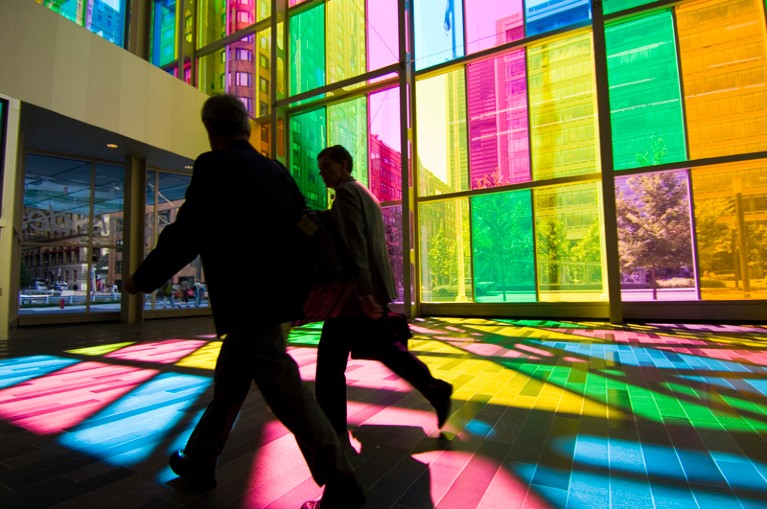
The Montreal Convention Centre in Canada, which hosted an AI meeting last week.Credit: Chris Cheadle/Getty
The challenges and promise of artificial intelligence (AI) drew hundreds of scientists to a conference in Montreal, Canada, last week. But it was human behaviour that was the focus of much of the attention. The event and the board of trustees that oversees the conference have been in the spotlight in recent months over claims that previous gatherings had fostered a hostile environment for women.
Exhibit A is the acronym that the event commonly went by: NIPS. Although its defenders could say it merely reflected the full title of the organization — Neural Information Processing Systems — the board agreed to a last-minute change. So, this year, machine-learning researchers, software engineers and programmers arrived in Canada for the ‘first’ NeurIPS conference.
It’s a small change, but a necessary, overdue and symbolic one. In a previous year, researchers attending a workshop for women in machine learning experienced boorish and offensive behaviour by some men who arrived wearing T-shirts emblazoned with a joke about nipples. And earlier this year, a survey of past attendees found that many respondents had experienced harassment, bullying and a lack of respect.
It is wrong that people ever experienced this behaviour, and it is sad that it has taken this long to respond, but the board deserves at least some credit for its response to the concerns raised by those in the community it represents, and for taking explicit steps to challenge and change the culture of the event.
The diversity and inclusion co-chairs of this year’s organizing committee, for example, sent a strong message about the expected conduct of attendees when they discussed at the conference’s opening remarks the measures in place at the event to make it more inclusive. The first invited talk also covered the necessity of diversity in technology.
It is difficult to know whether these and other actions had a measurable effect. But women who have attended in the past reported a welcome shift in the atmosphere of this year’s event, and many applauded the board and organizers for their efforts to combat bad behaviour and encourage inclusiveness. These include an updated code of conduct that forbids event sponsors from using sexualized clothing or costumes, a town-hall meeting to discuss the issues, on-site childcare and stickers that help inclusion by flagging up first-time attendees and highlighting the pronoun that people prefer to be referred to by. In addition, more specific meetings for under-represented groups ran alongside the conference than in previous years.
They are small steps down a long road. Most participants easily adopted the name NeurIPS, with only a few accidentally slipping up and mentioning NIPS. There were no offensive T-shirts at conference events and no supply of commemorative coffee mugs — at least when the conference opened — as the name change came too late to get them printed.
Too often, the burden of work involved in increasing diversity and inclusivity falls on those from under-represented groups. NeurIPS is no exception.
One of the organizers of the Black in AI workshop at NeurIPS, Timnit Gebru, a computer-vision researcher at Stanford University, California, spoke for many of the session organizers when she told the diversity town-hall meeting that coordinating the event had reduced the time available for her research. The diversity and inclusion co-chairs, Katherine Heller and Hal Daumé, who have had to walk the fine line between a vocal research community pushing for change and a conference board that has been slow to realize the significance of its actions, also say they have seen considerable disruption to their research. Only Heller, who is at Duke University in Durham, North Carolina, has so far committed to returning to the post next year. These examples underscore the fact that increasing diversity is a job for everyone and it is not sustainable or fair to rely on a small number of volunteers to do this important work.
The challenge should not be underestimated. The organizers of another major AI conference, the International Conference on Learning Representation, announced last month that they would hold their 2020 event in Addis Ababa in a bid to widen the pool of talent that can attend. But this well-meaning initiative is not without problems. Some members of the LGBTQ+ community raised concerns about holding the meeting in a country with anti-homosexuality laws. Organizers assured them of their safety, and that many scientific conferences had been held there before.
The Canadian government has come under fire for denying entry or being slow to approve visas for many researchers invited to attend NeurIPS from overseas. More than half of the 200 people who sought visas to attend the Black in AI workshop did not receive them in time, including several who dedicated huge amounts of time to organizing the event.
There have been many high-profile criticisms of AI algorithms that mimic, and so perpetuate, the biases of wider society. That the board of an AI conference — which in October called in a diversity and inclusion consultant to assist it — has taken a stand against such discrimination within its own ranks is a necessary and overdue step. Ensuring changes are deep and lasting will take much more time and effort. Meanwhile, many more institutions and organizations need to follow.

 Can a major AI conference shed its reputation for hosting sexist behaviour?
Can a major AI conference shed its reputation for hosting sexist behaviour?
 Bias detectives: the researchers striving to make algorithms fair
Bias detectives: the researchers striving to make algorithms fair





